

Zara Is the Latest Fast Fashion Retailer to Launch an Eco-Friendly Line. Zara’s owner Amancio Ortega is the second richest man in the world, according to Forbes, with a $67 billion dollar net worth.
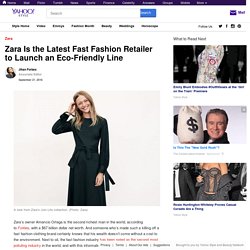
And someone who’s made such a killing off a fast fashion clothing brand certainly knows that his wealth doesn’t come without a cost to the environment. Next to oil, the fast fashion industry has been noted as the second most polluting industry in the world, and with this information, it’s up to leaders in the business to do something about it. Luckily, Zara is following the lead of other fast fashion retailers like H&M, launching the Join Life collection, an eco-friendly range of clothing crafted from materials like Tencel, recycled wool, and organic cotton.
“The collection embraces a woman who looks into a more sustainable future,” Zara explained in a post to Instagram. Zara has rolled out environmentally friendly initiatives before. Fashion Revolution Day - Fair Trade Winds. The Label Doesn’t Tell the Whole Story Check out this innovative campaign from the Canadian Fair Trade Network called “The Label Doesn’t Tell the Whole Story.”
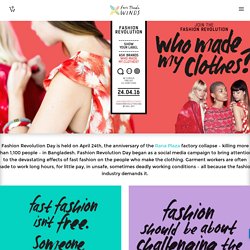
The ad features articles of clothing with extra long tags that tell the whole story of how it was made. The tag on this yellow sweater, for instance, reads: Made in Cambodia by Behnly, nine years old. He gets up at 5am every morning to make his way to the garment factory where he works. This powerful imagery is meant to remind us that the clothing we wear everyday isn’t made up of just 90% cotton & 10% spandex, so to speak; rather, each piece is made of both raw materials AND someone’s hard work. Source: Canadian Fair Trade Network.
How can the fashion industry become more sustainable? Can a hashtag change the fashion industry? Now in its second year, Fashion Revolution Day (FRD) is a hashtag campaign designed to keep the most vulnerable in the fashion supply chain in the public eye.
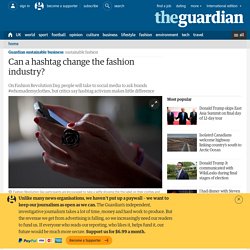
Held on the anniversary of the Rana Plaza factory collapse in Bangladesh, participants are encouraged to take a selfie showing the label on their clothes and ask the designer or brand #whomademyclothes. It’s an important cause, but can a hashtag campaign really bring meaningful change to the fashion industry? Ruth Stokes, author of The Armchair Activist’s Handbook, says if a campaign is able to raise awareness and reach people otherwise not engaged, then it has provided something of value. The challenge is translating that increased awareness into real-world practical actions, whether that means changing individual behaviors or the laws made by politicians. FRD has changed the hashtag this year to #whomademyclothes after Pixar took over #insideout in anticipation of the Disney animation film Inside Out. #whocares #meaningfulchange. Stella McCartney Admits That Even She's Not 100% Eco-Friendly.
In late April, the Financial Times’s (and soon to be New York Times's) Vanessa Friedman gave a speech at the Copenhagen Fashion Summit on the paradox of sustainability in the fashion industry.
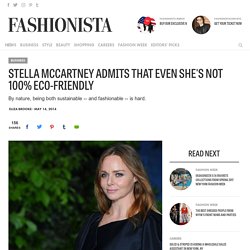
With designers piling on season after sub-season, the imperative to push new styles stands in opposition to any notion of permanence, Friedman argued. There are a few sides to sustainability in fashion. One is the manner in which a product is made — be that environmental practices or the treatment of workers, the failing of which was tragically exemplified in the Rana Plaza factory collapse last year. The other is the rate at which consumers are expected to replace that product with the next, more stylish thing. Both are dependent on fashion’s attitude toward values-driven business, which, Stella McCartney noted in an interview with Friedman at the FT Business of Luxury Summit in Mexico on Monday, is a notoriously fickle thing. That’s just it.
Watch McCartney's full interview with Friedman, below. H&M's 'Close The Loop' Collection Is Made From Your Old Clothes. Nina Farran of Fashionkind on Ethical and Sustainable Style for the Office. After about four years of working in finance, Nina Farran decided she was ready to hang up her business suits and invest her time in the world of ethical fashion.
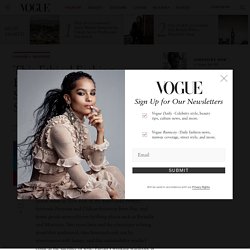
She started Fashionkind, a style blog with a sustainability slant in 2014, and after receiving numerous inquiries from readers, morphed the site into a virtual market stall for all her favorite ethical wares, including philanthropic-minded denim made in New York by the Rialto Jean Project, fair-trade Peruvian and Chilean knitwear from Voz, and home goods sourced from far-flung places such as Rwanda and Morocco. Two years later and the e-boutique is living proof that traditional, time-honored craft can be synonymous with luxury, and that sustainability needn’t come at the sacrifice of style. Farran’s working wardrobe is certainly a testament to that; her day-to-day look brings together statement-making baggy jeans, delicate jewelry, and minimalist heels—all ethically produced—with an unstudied, tomboyish sensibility. Fashion Revolution 'Who Made Your Clothes' Campaign Reveals Fashion Brands With Supply Chain Transparency.